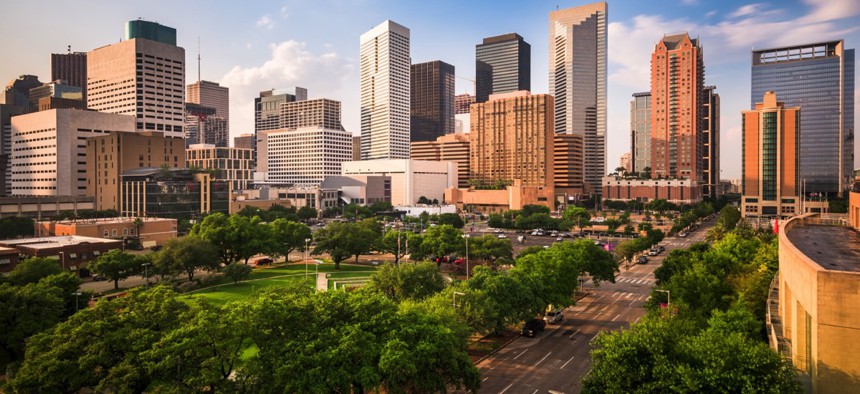Houston Promises Verizon’s Biggest 5G Rollout Yet

The city wanted a deal that improves service in overlooked areas.
Houston is the latest city to court a national carrier to get ahead of fifth-generation wireless technology and possibly cut a better deal for residents without access to broadband internet.
Verizon announced Monday that Houston would become the third U.S. city to receive its 5G internet service after Sacramento and Los Angeles. Officials said they choose Houston in part because of ongoing Hurricane Harvey recovery and resiliency efforts.
The national carrier will spend about $100 million in Sacramento and L.A. each—after having spent $300 million over three years on Boston’s fiber optic rollout—but Houston is set to receive “exponentially more,” said Mayor Sylvester Turner. The exact dollar amount of Verizon’s 5G investment remains “confidential,” he added, but it would reach low-income communities.
“Sometimes when we talk about the entire city of Houston, it doesn’t necessarily mean those neighborhoods that are underserved and under-resourced,” Turner said. “It’s the entire city of Houston, but we also wanted to make sure that the communities that we have identified, the Complete Communities, are included within that framework—so it’s everyone.”
Turner’s Complete Communities initiative looks to revitalize the historically overlooked neighborhoods of Acres Home, Gulfton, Near Northside, Second Ward, and Third Ward.
Incoming Verizon CEO Hans Vestberg was quick to pump the breaks on talk of extending 5G service, expected to be 1,000 times faster than 4G, to outlying areas like Sugar Land.
“This is in stages, and remember what I said about 5G: There are multiple use cases of 5G,” Vestberg said. “The first use case we’re going to do here in Houston is about fixed-wireless access—meaning broadband to the home based on wireless—which is uniquely positioned when you have the millimeter wave spectrum that Verizon has.”
“Of course, over time, you bring in the mobility.”
The wireless industry made a similar case at Wednesday’s Senate Commerce committee 5G hearing in D.C.
National carriers, all of which have promised 5G this year, want the technology’s rollout to be as broad and fast as possible—lest China win the global race and peddle its products to the world first.
“5G is admittedly going to start in more urban areas, bigger cities,” said Meredith Baker, CTIA - The Wireless Association president and CEO. “But the faster we can make those big cities connected, the more we’re going to get to less populated areas, smaller communities.”
Outdated local siting rules that require the same regulatory treatment of 5G’s small cell technology as 200-foot cell towers, as well as limited wireless spectrum access to mid-band spectrum, in particular, could cost the U.S., she added.
Many local governments and smaller wireless internet service providers worry the Federal Communications Commission will side with national carriers in agreeing to auction off spectrum in large service areas that only the big companies can afford to bid on. Further consolidation of the mobile industry means less competition and fewer provider options for local communities.
This is true for the 3.5 GHz “innovation” band national carriers are hoping will become the backbone of their 5G rollouts, but also 3.7 to 4.2 GHz mid-band and 6 GHz band spectrum for unlicensed use, which were the subject of the Senate hearing.
“Mid-band is critical for 5G, and I’ll reiterate that this is a race,” Baker said. “We are third [globally] because we are sixth in mid-band spectrum.”
Baker’s analysis seemed to conflict with that of Vestberg, who on Monday said Verizon is two years ahead of the global 5G standard.
Meanwhile, Charter Communications Inc. has spent the last year testing a possible rural broadband solution in seven markets using the 3.5 GHz band—achieving the FCC minimum speed of 25 megabits per second up to 5 miles from a small cell, said Craig Cowden, the company’s wireless technology senior vice president.
Cities worried the wireless industry will ultimately succeed in curtailing local authority and choice, as the federal government reforms small cell siting and spectrum auction policies, could go Houston’s route and cut a deal with a carrier.
Two companies passed over Houston because it lacked 5G, Turner said, but now the city is looking at how 5G can enhance data for controlling traffic flow, smart streetlights and driverless car pilots.
Verizon won’t reveal the cost of its 5G service until its commercial offering is announced, Vestberg said, and it will be announcing one more 5G city before then.
Dave Nyczepir is a News Editor at Government Executive’s Route Fifty and is based in Washington, D.C.
NEXT STORY: How agencies can use containers for IT (not just shipping)






